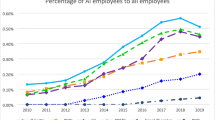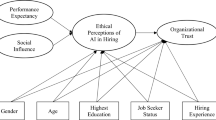Abstract
Predictions concerning structure and performance for managerial incentive contracts designed to prevent accidents are developed and tested. The model predicts a step-function penalty with more costly, more reliable audits used for higher loss reports to control ex post exaggeration of the loss. In addition, the penalty induces nonreporting that is imperfectly controlled through random audits. An empirical contract implemented to control workers' compensation medical losses provides evidence consistent with these predictions. The contract reduces both accident frequency and total losses, but increases reported loss severity as managers evade approximately 40% of the accident penalty by underreporting small losses.
Similar content being viewed by others
References
Arrow, Kenneth J. (1985). “The Economics of Agency.” In John Pratt and Richard Zeckhauser (eds.), Principals and Agents. Cambridge, MA: Harvard Business School Press.
Boyer, Marcel, Georges Dionne, and Charles Vanasse. (1992). “Econometric Models of Accident Distributions.” In G. Dionne (ed.), Contributions to Insurance Economics. Boston, MA: Kluwer Academic Publishers.
Butler, Richard J., and John D. Worrall. (1991). “Claims Reporting and Risk Bearing Moral Hazard in Workers' Compensation,” The Journal of Risk and Insurance 58, 191–204.
Dionne, Georges, and Pierre St-Michel. (1991). “Workers' Compensation and Moral Hazard,” Review of Economics and Statistics 73, 236–244.
Dionne, Georges, and Pascale Viala. (1992). “Moral Hazard, Renegotiation, and Debt,” Economics Letters 46, 113–119.
Doherty, Neil. (1979). “National Insurance and Absence from Work,” Economic Journal 89, 50–63.
Fields, Joseph A., and Emilio C. Venezian. (1991). “Medical Cost Development inWorkers' Compensation,” The Journal of Risk and Insurance 58, 497–504.
Harris, Milton, and Artur Raviv. (1978). “Some Results on Incentive Contracts with Applications to Education and Employment, Health Insurance, and Law Enforcement,” American Economic Review 68, 20–30.
Hausman, J., B. H. Hall, and Z. Griliches. (1984). “Econometric Models for Count Data with an Application to the Patents-R&D Relationship,” Econometrica 52, 909–938.
Holmstrom, Bengt. (1979). “Moral Hazard and Observability,” Bell Journal of Economics 10, 74–91.
Hosios, Arthur J., and Michael Peters. (1989). “Repeated Insurance Contracts with Adverse Selection and Limited Commitment,” Quarterly Journal of Economics 104, 229–253.
Huberman, G., David Mayers, and Clifford W. Smith, Jr. (1983). “Optimal Insurance Policy Indemnity Schedules,” Bell Journal of Economics 14, 415–426.
Marshall, John M. (1976). “Moral Hazard,” American Economic Review 66, 880–890.
Mookherjee, Dilip, and Ivan Png. (1989). “Optimal Auditing, Insurance and Redistribution,” Quarterly Journal of Economics 104, 205–228.
Rose, N. (1990). “Profitability and Product Quality: Economic Determinants of Airline Safety Performance,” Journal of Political Economy 98, 944–969.
Rothschild, Michael, and Joseph E. Stiglitz. (1970). “Increasing Risk: I. A Definition,” Journal of Economic Theory 2, 225–243.
Spence, A. Michael, and Richard Zeckhauser. (1971). “Insurance, Information, and Individual Action,” American Economic Review 61, 380–387.
Townsend, Robert M. (1979). “Optimal Contracts and Competitive Markets with Costly State Verification,” Journal of Economic Theory 22, 265–293.
Winter, Ralph A. (1992). “Moral Hazard and Insurance Contracts.” In G. Dionne (ed.), Contributions to Insurance Economics. Boston, MA: Kluwer Academic Publishers.
Author information
Authors and Affiliations
Rights and permissions
About this article
Cite this article
PUELZ, R., SNOW, A. Optimal Incentive Contracting with Ex Ante and Ex Post Moral Hazards: Theory and Evidence. Journal of Risk and Uncertainty 14, 169–188 (1997). https://doi.org/10.1023/A:1007769210613
Issue Date:
DOI: https://doi.org/10.1023/A:1007769210613




